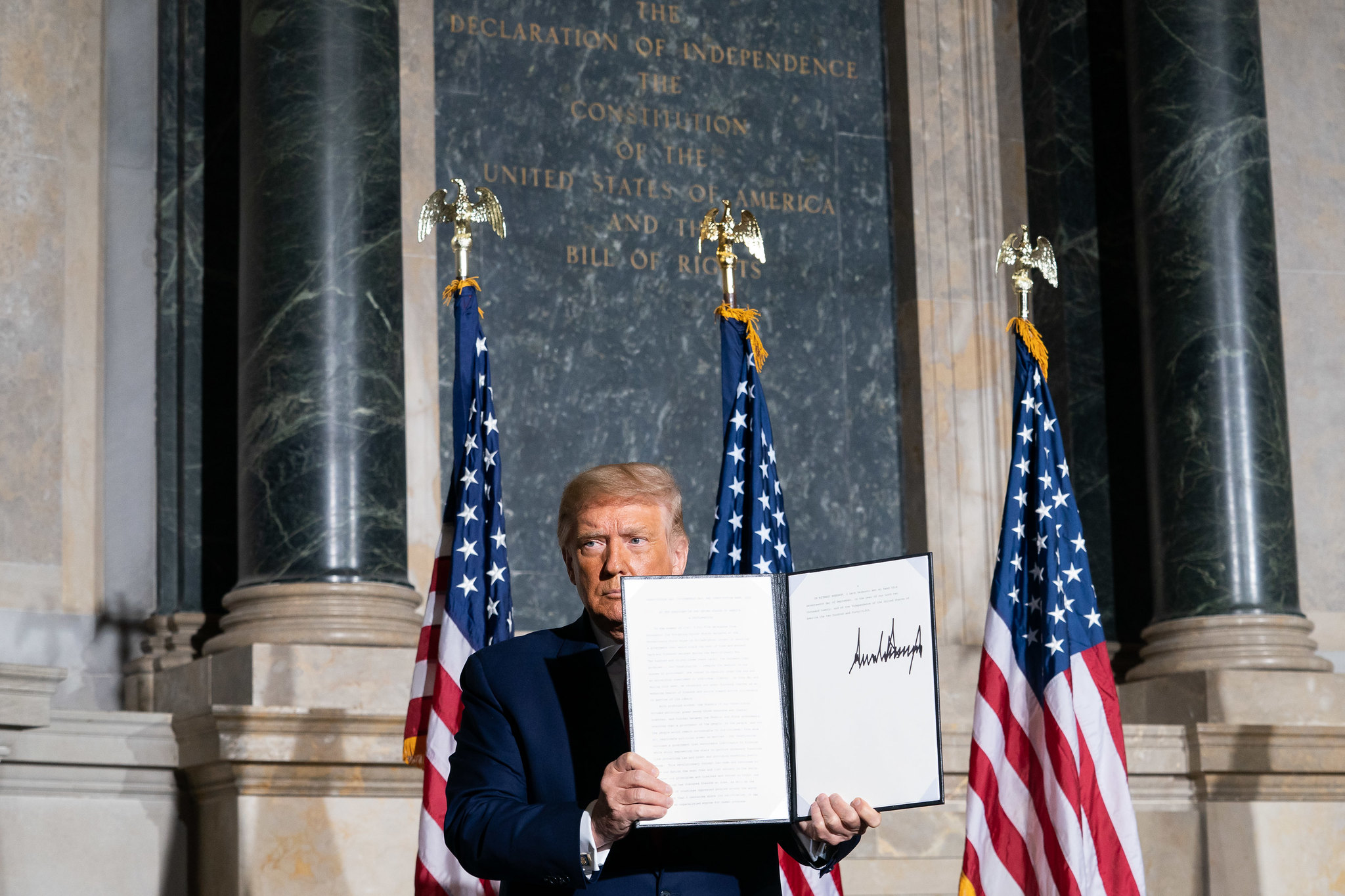Federal Court Halts Trump’s Ban on Nonimmigrant Visas
On Oct. 1, a federal judge granted a preliminary injunction against President Trump’s nonimmigrant visa ban. What’s in the decision?

Published by The Lawfare Institute
in Cooperation With

In an important ruling on Oct. 1, Judge Jeffrey White of the U.S. District Court for the Northern District of California granted a preliminary injunction against President Trump’s nonimmigrant visa ban (NIV ban).
The ban would have suspended visas for many temporary skilled workers and their families, regardless of their country of origin. White’s ruling in National Association of Manufacturers v. U.S. Department of Homeland Security means that the National Association of Manufacturers and members of other groups that challenged the ban can continue to benefit from skilled temporary foreign national workers who also aid the U.S. economy.
In issuing the NIV ban, Trump relied on 8 U.S.C. § 1182(f) of the Immigration and Nationality Act (INA), which authorizes the president to bar entry of foreign nationals “detrimental to the interests of the United States”—the same provision that Trump used for his travel ban, which the Supreme Court upheld in Trump v. Hawaii. According to Trump, the NIV ban would protect U.S. jobs at risk during the pandemic.
With modest exceptions—such as one for medical professionals serving during the coronavirus crisis—the ban suspended all nonimmigrant visas in the H-1B, H-2B, J and L programs. These suspended visas included intracompany transfers (the L visa); specialized and seasonal nonagricultural workers and their families (the H category); and exchange teachers, students and trainees (the J category). This consequence of the NIV ban would have disrupted U.S. companies’ operations, which often depend on nonimmigrant visas to fill significant labor gaps.
Each of these visa categories entails a niche in which companies cannot find U.S. workers. In fact, most of the categories require a company to certify and demonstrate that it could not find U.S. workers for the positions and that offering temporary work to foreign nationals will not affect U.S. workers’ salaries or workplace conditions. The National Association of Manufacturers, the Chamber of Commerce and other groups, represented by Paul Hughes of McDermott Will & Emery, argued that the NIV ban would impair U.S. companies’ ability to bounce back from the ongoing pandemic-related economic downturn.
White took a two-pronged approach that narrowly reads the Supreme Court’s Hawaii decision. First, referring to Chief Justice John Roberts’s language in Hawaii, White noted that the NIV ban sought to “supplant,” not merely “supplement,” provisions of the Immigration and Nationality Act. In Hawaii, Roberts had explained that the travel ban reinforced the INA's national security provisions by retaliating against countries that did not diligently vet visa applicants. In this case, White noted that the NIV ban was inconsistent with a detailed statutory scheme that already safeguarded U.S. workers. According to White, assessing the NIV ban’s legality required reading the ban in light of this detailed scheme, instead of reading the ban in isolation from the rest of the statute.
In addition, White found that the NIV ban was unmoored from the national security and foreign relations rationales that drove the travel ban and all of the 40-plus pre-Trump proclamations under § 1182(f). True to the Cold War roots of the provision, previous proclamations either retaliated against foreign nations like those affected by the travel ban, or signaled U.S. cooperation in multilateral campaigns against human trafficking, war crimes or cyber incursions. The NIV ban, in contrast, cited “the threat of competition for scarce jobs” in the U.S. among American workers and foreign nationals—but did so without acknowledging the safeguards for U.S. workers that Congress had built into the nonimmigrant visa provisions.
In finding that the NIV ban lacked a nexus with the conduct of foreign governments, White at page 12 n. 3 of his opinion cited the amicus curiae brief by Immigration Law scholars (in which I served as co-counsel with Penn State’s Shoba Sivaprasad Wadhia and Loeb & Loeb’s Neil Nandi and Laura McNally). Since White found no national security or foreign affairs nexus with the NIV ban, the ban did not merit the deference that the Hawaii court had displayed with respect to the travel ban.
To respond to White’s ruling, the government may seek a stay from the U.S. Court of Appeals for the Ninth Circuit. If that is denied, the government may seek relief from the Supreme Court.



.jpg?sfvrsn=676ddf0d_7)

